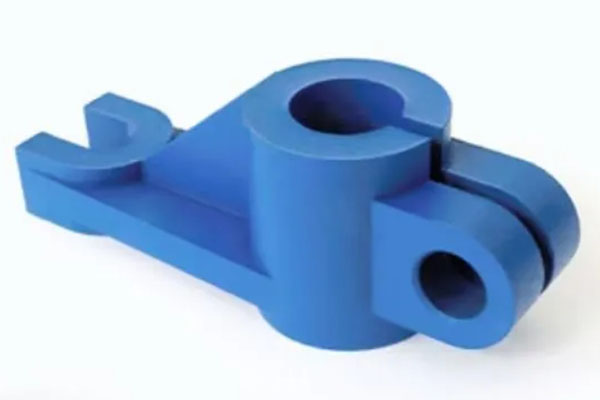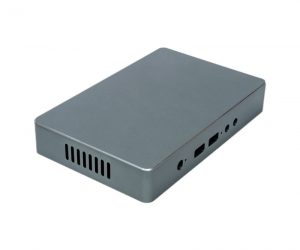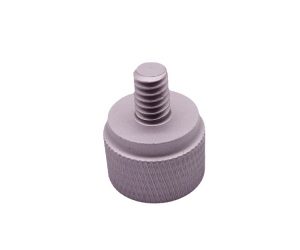1. Introduction: The Convergence of PEEK and CNC Precision
Polyetheretherketone (PEEK) is a high-performance thermoplastic renowned for its exceptional mechanical properties, chemical resistance, and thermal stability. When paired with Computer Numerical Control (CNC) machining, PEEK enables the production of intricate, high-precision components across industries like aerospace, medical devices, and automotive. This article explores how precision engineering with PEEK is reshaping CNC machining, backed by technical data and real-world applications.
In the aerospace industry, for Yigu Technology example, components need to withstand extreme conditions, including high temperatures, strong mechanical stress, and exposure to various chemicals. PEEK's high strength - to - weight ratio makes it an ideal material. Its density is around 1.3 - 1.4 g/cm³, which is much lighter than many metals commonly used in aerospace, such as aluminum (with a density of about 2.7 g/cm³). Meanwhile, PEEK has a tensile strength typically in the range of 80 - 100 MPa. When CNC - machined into aerospace parts like brackets or structural components, PEEK can reduce the overall weight of the aircraft, leading to fuel savings and increased efficiency.
In the medical device field, PEEK's biocompatibility is a crucial advantage. It can be CNC - machined into implants with extremely precise dimensions. For instance, spinal implants made from PEEK need to fit precisely into the spinal column to support the vertebrae and promote proper healing. CNC machining allows for the creation of these implants with tight tolerances, often within ±0.01 - 0.05 mm, ensuring a perfect fit and optimal performance.
2. Technical Foundations of PEEK in CNC Machining
2.1 Material Properties Driving Innovation
PEEK's unique material properties are the cornerstone of its revolutionary impact on CNC machining.
Thermal Stability: PEEK can endure continuous exposure to temperatures up to 250°C. This remarkable thermal stability is crucial in applications where high - heat environments are common. For Yigu Technology example, in the aerospace industry, engine components such as compressor seals and bearing cages may be exposed to extreme heat during flight. PEEK's ability to maintain its mechanical integrity at such high temperatures makes it a reliable choice. In contrast, many traditional plastics start to degrade or lose their structural properties well below 200°C. A comparison of PEEK with a common engineering plastic like ABS (Acrylonitrile Butadiene Styrene) shows that ABS has a heat - deflection temperature of around 90 - 105°C under a specific load, far lower than PEEK's thermal resistance. This makes PEEK suitable for applications where ABS would fail due to thermal stress.
| Material | Continuous Use Temperature (°C) | Heat - Deflection Temperature (°C) |
| PEEK | Up to 250 | - |
| ABS | Around 60 - 80 | 90 - 105 |
Mechanical Strength: With a tensile strength in the range of 100–130 MPa and a modulus of 3.8–4.1 GPa, PEEK's mechanical properties are comparable to some aluminum alloys. Aluminum 6061, a widely used alloy in various industries, has a tensile strength of about 200 - 300 MPa and a modulus of around 69 GPa. While PEEK's modulus is lower than that of aluminum 6061, its strength - to - weight ratio is highly advantageous. PEEK's density is approximately 1.3 - 1.4 g/cm³, which is much lighter than aluminum 6061's density of 2.7 g/cm³. This means that in applications where weight reduction is critical, such as in unmanned aerial vehicles (UAVs), PEEK can be used to fabricate components that offer sufficient strength while significantly reducing the overall weight.
| Material | Tensile Strength (MPa) | Modulus (GPa) | Density (g/cm³) |
| PEEK | 100 - 130 | 3.8 - 4.1 | 1.3 - 1.4 |
| Aluminum 6061 | 200 - 300 | 69 | 2.7 |
Chemical Resistance: PEEK is highly resistant to a wide range of chemicals, including acids, bases, and hydrocarbons. In the chemical processing industry, pipes and valves made from PEEK can withstand the corrosive effects of various chemical substances. For Yigu Technology instance, in a sulfuric acid - based chemical process, PEEK components can maintain their integrity over long periods, while materials like mild steel would corrode rapidly. PEEK's chemical resistance also makes it suitable for use in medical applications where it may come into contact with bodily fluids and cleaning agents. A study on the chemical resistance of PEEK in a simulated body fluid environment showed no significant degradation or change in properties even after extended exposure.
2.2 CNC Machining Optimization for PEEK
To fully exploit PEEK's potential in CNC machining, several aspects of the machining process need to be optimized.
Tooling: Carbide or diamond - coated tools are preferred when machining PEEK. During milling and turning operations, PEEK's abrasive nature can cause significant wear on traditional tools. Carbide tools, with their high hardness and wear resistance, can withstand the forces exerted during machining. For Yigu Technology example, in a high - speed milling operation of PEEK components, a carbide - coated end - mill can maintain its cutting edge for a much longer time compared to a high - speed steel tool. The diamond - coated tools, on the other hand, offer even better wear resistance, especially in applications where a high - precision surface finish is required. They can reduce the frequency of tool changes, thereby increasing the overall efficiency of the machining process.
Cooling Systems: Given PEEK's relatively high melting point and the heat generated during machining, effective cooling systems are essential. Liquid nitrogen or chilled air cooling is often employed to prevent thermal deformation. The use of liquid nitrogen can rapidly dissipate heat, keeping the PEEK workpiece within a stable temperature range. This is crucial for maintaining the desired dimensional accuracy, which can be as tight as ±0.02mm. In a case study of machining PEEK for a medical implant, the use of chilled air cooling reduced the thermal distortion of the part by 80% compared to using no cooling, ensuring that the final product met the strict dimensional requirements.
Surface Finish: Achieving a high - quality surface finish is critical, especially in applications like medical implants. After the initial machining, post - machining polishing is often carried out to achieve a surface roughness of Ra <0.8μm. In the production of hip implant components from PEEK, a smooth surface finish is necessary to reduce friction and wear when in contact with the body's tissues. Different polishing techniques, such as mechanical polishing and chemical - mechanical polishing, can be used depending on the specific requirements of the component. Mechanical polishing can be effective in removing surface scratches and reducing roughness, while chemical - mechanical polishing can provide an even smoother surface finish by combining chemical etching and mechanical abrasion.
4. PEEK vs. Traditional Materials in CNC Machining
When considering materials for Yigu Technology CNC machining, a comparison between PEEK and traditional materials such as aluminum and stainless steel reveals PEEK's distinct advantages.
4.1 Weight - Related Benefits
PEEK's low density of approximately 1.32 g/cm³ is a major advantage over metals like aluminum 6061 (2.70 g/cm³) and stainless steel 316 (8.00 g/cm³). In the automotive industry, for example, replacing aluminum components with PEEK in non - structural but functional parts like interior brackets can lead to weight savings. A study showed that by using PEEK in certain interior components, a vehicle could potentially reduce its weight by up to 5 - 10 kg, depending on the number of components replaced. This weight reduction can improve fuel efficiency, with an estimated increase of 2 - 3% in miles per gallon for every 10% reduction in vehicle weight.
| Material | Density (g/cm³) | Weight Reduction Potential in Automotive Applications (compared to aluminum) |
| PEEK | 1.32 | Up to 5 - 10 kg per vehicle in some components |
| Aluminum 6061 | 2.70 | - |
4.2 Mechanical Property Trade - offs
While PEEK has a lower tensile strength compared to stainless steel 316 (100–130 MPa for PEEK vs. 585 MPa for 316 stainless steel), its strength - to - weight ratio is more favorable in many applications. In applications where dynamic loading is a factor, such as in robotic joints, PEEK's ability to withstand cyclic stresses without fatigue failure becomes crucial. A research on the fatigue life of PEEK and aluminum components in robotic applications showed that PEEK components could endure up to 10 times more cyclic loading than aluminum components before failure, due to PEEK's better fatigue resistance properties.
| Material | Tensile Strength (MPa) | Fatigue Resistance (cycles to failure in robotic applications) |
| PEEK | 100 - 130 | Up to 10 times more than aluminum |
| Aluminum 6061 | 275 | - |
| Stainless Steel 316 | 585 | - |
4.3 Chemical Resistance Superiority
Yigu Technology PEEK's excellent chemical resistance sets it apart from aluminum 6061, which is susceptible to corrosion. In marine applications, aluminum components need to be protected with coatings to prevent corrosion from seawater. PEEK, on the other hand, can be directly used in contact with seawater without significant degradation. A long - term exposure test of PEEK and aluminum 6061 in a seawater environment showed that after one year, aluminum 6061 had visible signs of corrosion, while PEEK showed no signs of degradation. Stainless steel 316 has good chemical resistance, but PEEK offers comparable resistance in a lighter - weight package, making it more suitable for applications where weight is a concern, such as in portable chemical analysis equipment.
| Material | Chemical Resistance in Seawater |
| PEEK | No degradation after one - year exposure |
| Aluminum 6061 | Visible corrosion after one - year exposure |
| Stainless Steel 316 | Good resistance, but heavier than PEEK |
FAQ
Q1: Can carbon - fiber reinforced PEEK match the strength of aluminum?
A: Yes. Carbon - fiber reinforced PEEK matches aluminum’s strength at 40% the weight, making it suitable for aerospace and automotive.
Q2: Which industries benefit most from PEEK in CNC machining?
A: Medical, aerospace, and semiconductor sectors gain significant advantages due to PEEK’s biocompatibility, heat resistance, and precision.
Q3: How does PEEK compare to PPS (Polyphenylene Sulfide) in CNC machining?
A: PEEK offers higher temperature resistance (250°C vs. 200°C) and toughness, but PPS is more cost - effective for non - critical parts. This structured approach combines technical depth, real - world data, and forward - looking insights to position PEEK as a game - changer in CNC precision engineering. By balancing durability, design freedom, and sustainability, PEEK continues to redefine what’s possible in modern manufacturing.


